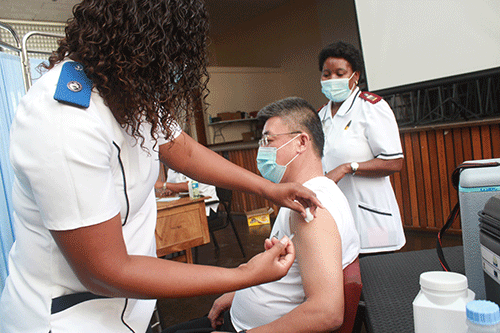An ambitious campaign to vaccinate 70% of teachers and 70% of learners by June was launched in Windhoek last week.
The education, health and information ministries activated the six-month advocacy and public education campaign, targeting all schools in Namibia.
The campaign targeting school communities came after a campaign under the theme ‘Get Vaccinated, Help Kick Covid-19 out of Namibia’ in August 2021, which targeted all eligible Namibians from the age of 18 years, spearheaded by government.
The campaign aims to increase the level of awareness and knowledge on the safety and efficacy of Covid-19 vaccines, including vaccines available for children and adolescents, to mobilise the school community.
This includes learners, principals, teachers, board members, parents and the communities around the schools to accept and allow the vaccination of eligible children (12 to 17 years of age) as well as build public trust in the government’s Covid-19 response efforts.
The country’s vaccination campaign kicked off a year ago but misinformation has fuelled hesitancy, with only 381 826 adults having completed their two doses, or one dose of Johnson & Johnson, translating to only 26% of adults having been fully vaccinated.
Speaking at the launch, the education ministry’s deputy executive director, Edda Bohn said the ministry intends to play its role in contributing to the achievement of national herd immunity through vaccination, which is the key priority measure set to attain maximum control of the pandemic.
Bohn stated vaccine hesitancy, remains a public health threat, especially among parents and teachers.
“The ministry will further coordinate with schools for eligible learners to be vaccinated during the planned national campaign. However, learners aged 12 to 13 will require parental consent to be vaccinated. Consent forms will be provided on-site and at schools to allow parents and guardians to give consent for their children,” she said.
Bohn also appealed to communities to cooperate with the campaign teams and understand the importance of getting eligible children vaccinated.
“Similarly, we urge parents, teachers and children and the public at large to be aware of misinformation and familiarise themselves with credible and verifiable sources of information regarding vaccination against this deadly pandemic,” she said.
Speaking at the same event, health minister Dr Kalumbi Shangula reported the clusters of new infections in school and deaths among children and adolescents although they are not necessarily comparable to the numbers in the adult population.
“Through analysis of data, we know Covid-19 in children is sometimes milder than in adults, but children can also have complications such as multisystem inflammatory syndrome that may require intensive care or long-lasting symptoms that affect their health and well-being,” he said.
Although Namibia has started to administer Covid-19 vaccines to eligible children as per the guidance from the WHO; by 25 March, only 15 673 (6%) of the target population (307 298) have so far received two doses of Pfizer/BioNTech.
Shangula is optimistic that the campaign will bring vaccines closer to children and adolescents, in schools.
Shangula, urged the nation to get vaccinated during this period ahead of the winter seasons when cases tend to increase.
– ashikololo@nepc.com.na



